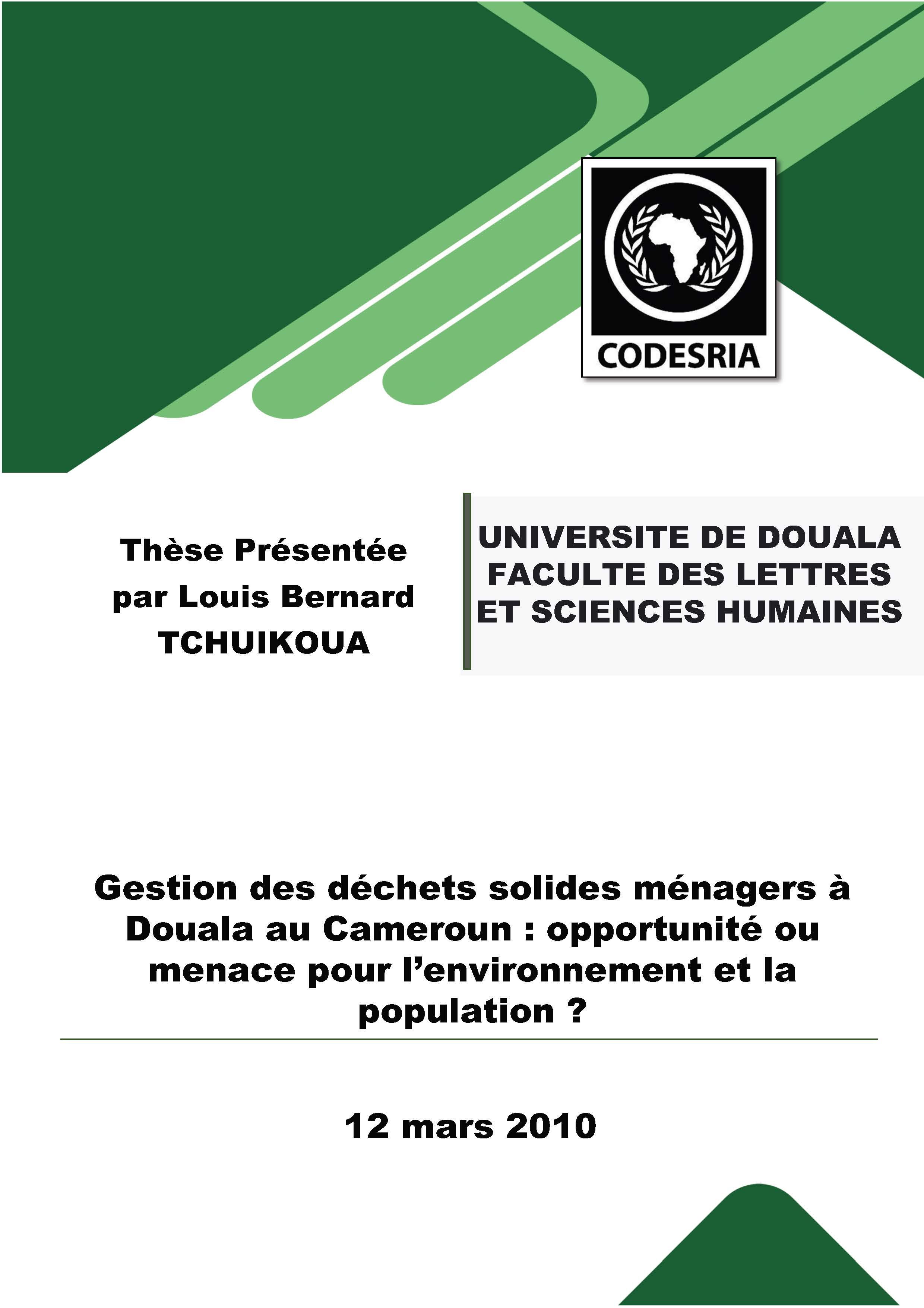Gestion des déchets solides ménagers à Douala au Cameroun : opportunité ou menace pour l’environnement et la population ?
Keywords:
Domestic waste, ecological threats, environmental management, popular pactices, optimization of refuse, public health, urbain space, Douala, CameroonSynopsis
Since the Seventies, the vast spreading out of Douala, amplified by a running demography, involved an imbalance of its urban organization. Consequently, disparities increased between the districts, complicating the social and spatial structure and the functioning of the whole area. The construction of the city was and continues to be settled by logics and actions who bring about the amplification of an urban disorder. In this context, the problems which this research approaches are that of the environmental and medical threats related to the bad management of domestic solid waste in Douala, whereas the latter abounds in socio-economic and energy opportunities which could be developed, reducing at the same time ecological hazards. Armed with this knowledge, we introduced the following assumption : « The bad management of domestic solid waste in Douala shows that for the time being it constitutes primarily a threat. The emergence of the popular practices in this management, and the ever-present environmental-medical risks that are related to these practices, testify truly to the existence of the threat. However, since domestic solid waste, beyond the activities of salvage, can also be transformed into “clean manure” or into biomass usable within the framework of renewable energies, we will be able to declare that domestic solid waste is an opportunity in the sustainable development, even if such opportunities are less developed or not in the town of Douala. »
From the observations on the field, the investigations with urban dwellers and some social and institutional actors, the readings in the libraries, the space locations (cartography, ground level and aerial photography), and our empirical knowledge, we can make certain that since the Seventies, the city of Douala undergoes a spectacular space growth. Thus the unconstructible areas (steeply sloping zones, marshes and mangrove) were widely colonized by dwellings, without any plan of preliminary installation. Consequently, the majority of these areas, moreover isolated, which we called territories of middle salubrity and unsanitary territories, hardly provide the effective strategies of modern management. As for the actions implemented by HYSACAM, which is in charge of the modern waste management, they are inadequate. These failures caused the emergence in this management of some popular practices that proved to be unsuitable in the urban milieu, and carrying environmental risks. In addition, economic and energetic opportunities in the field of domestic waste are almost unknown for the majority as well as for the local government.
Therefore we proposed some ways out and ideas about domestic waste which could minimize the threats, while developing related opportunities. Namely : rigorous help observance of the current regulation, installation of a municipal police force of environment, popularization campaigns about the environment and the sustainable development, formal gathering of the NGO that already take part in pre-collection and optimization of refuse, promotion of individual composting, closing of the sole (and harmful) rubbish dump that currently works in Douala, setting-up of a project of biomethanation of waste, and creation of a local ecotax in Cameroon.
Downloads
References
ADEME, 2002.- La gestion de proximité de déchets organiques, synthèse et fiches de cas France et Étranger, Angers, 33 p.
ADEME, 1994.- Les déchets en chiffres, données et références, 146 p. 266. AUTREPART, Avril 2007.- La ville face à ses marges, Armand Colin, Paris, 228 p.
Capital social, septembre-Octobre 2002.- Bulletin des acteurs de la société civile pour le développement, n°009, 19 p.
DE PLAEN et al. 2004.- Leçons du forum international sur les approches écosystèmes et santé humaine : vers une vision commune, supplément Ecosanté au volume 1, n°2, 157 p.
ECOLOGIE URBAINE, 1994 à 1997.- Les déchets, les cahiers de l’environnement n°4, 47 p.
ECOVOX n° 25 du 10-05-2002.- Gros plan sur le phénomène de la société civile ; scène-acteurs-défis (périodique).
FORGET et al., 2001.- « une approche d’écosystème à la santé humaine », journal International de la santé professionnelle et environnementale, supplément au volume 7, n°2, p 537-538.
IPALA YOBWA J. ILANGA J., 1999.- Politiques et stratégies de développement durable des ressources forestières au Congo Démocratique in Le Flamboyant, n°52, décembre 1999.
Revue d’urbanisme, 2004.- Disparités territoriales, actes de la 24ème rencontre nationale des agences d’urbanisme, hors série n°21, Paris, 70 p.
STREN R. et al., 1992.- « African urban research since the late 1990s: response to poverty and urban “ growth”», Urban Studies, vol. 29, n° 3–4, pp. 533–588.
TA THU TUY, 1998.- « Pour une gestion efficiente des déchets dans les villes Africaines, les mutations à conduire », Les cahiers PDM, 59 p.
WAAS, E. 1990.- « Déchets urbains, déchets pluriels», in Environnement Africain n° 29-30, vol. VIII, 1, 2, Dakar-Sénégal.






